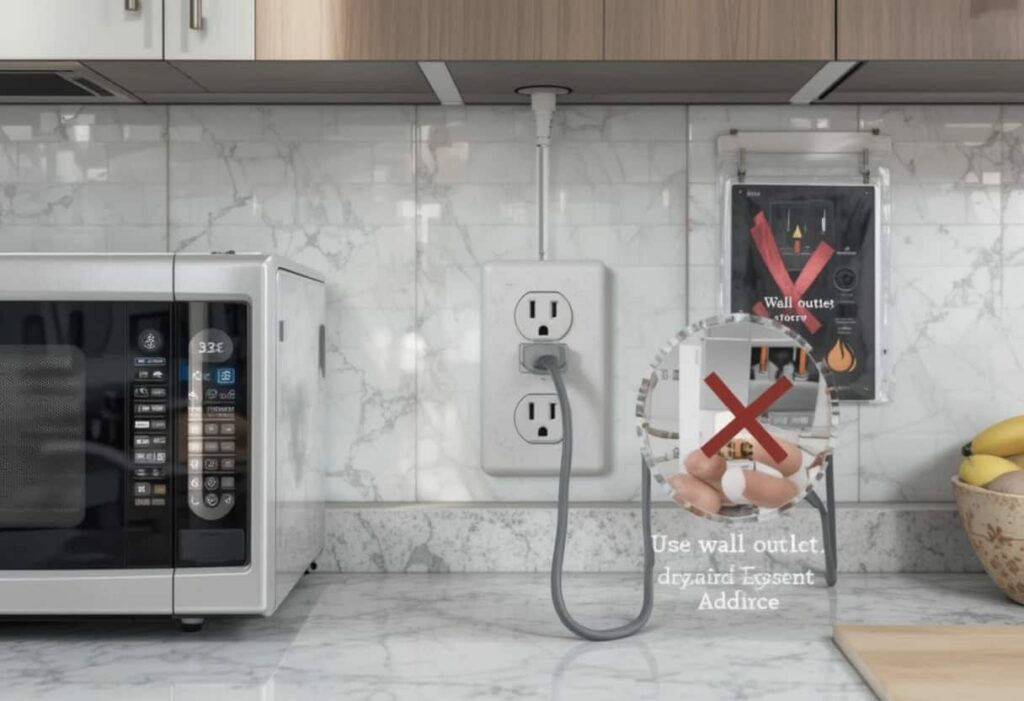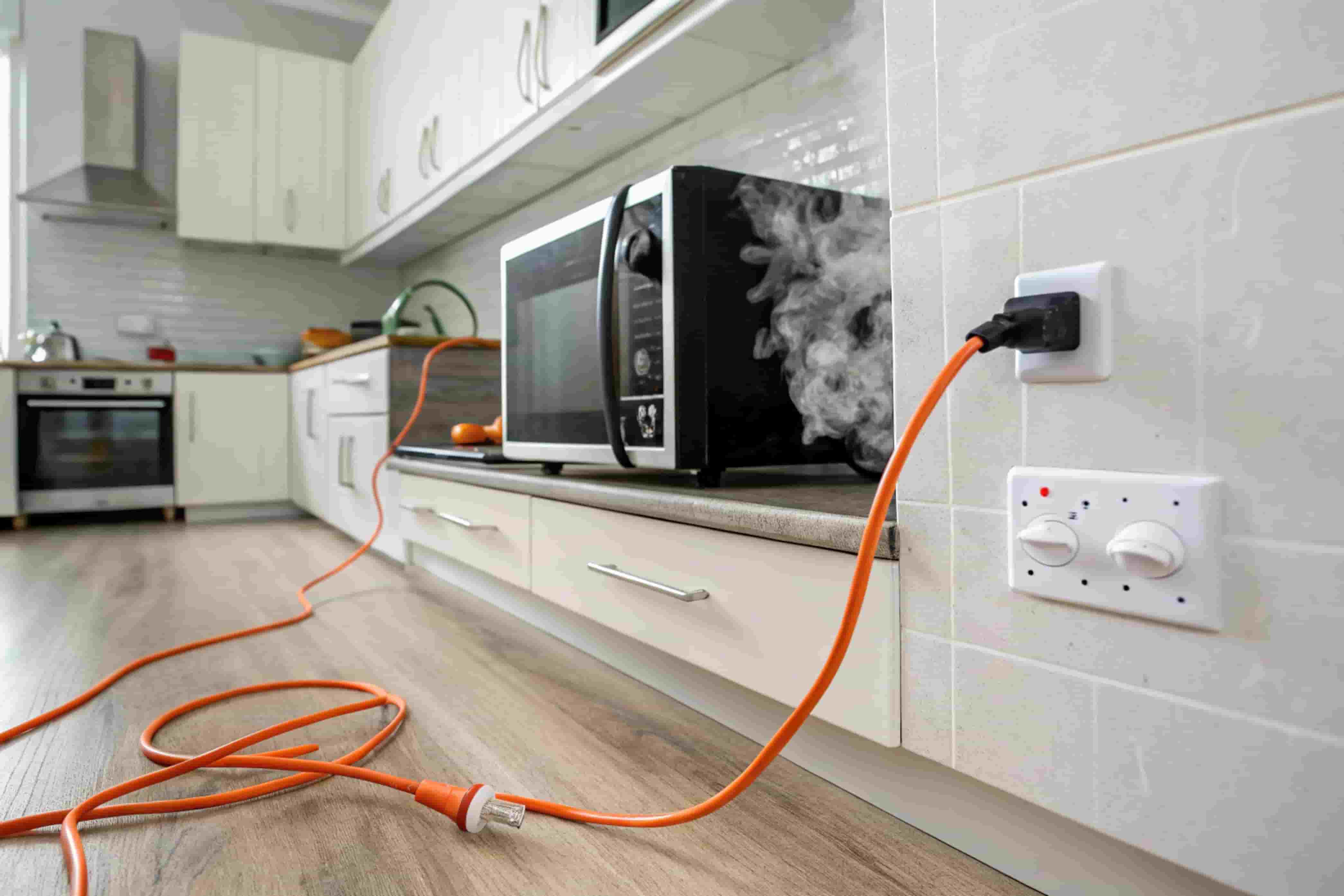Microwaves are among the most commonly used kitchen appliances, offering convenience for fast-paced lifestyles. But their high energy demands also mean they require specific attention when it comes to electrical safety. Many people often find that the placement of their microwave and the distance to the nearest wall outlet don’t quite match, making the idea of using an extension cord tempting.
This decision, however, involves more than just convenience. It ties into safety, appliance longevity, and potential fire risks. Understanding how microwaves work and what type of electrical setup they need can help prevent damage to your home or appliances. In this article, we will share essential facts, practical advice, and real experiences about using extension cords with microwaves.
Why Microwaves Need Special Power Consideration?
High Wattage Appliances Demand More:
Microwaves are not like phone chargers or lamps. They typically operate between 600 to 1200 watts, sometimes more depending on the model. This puts them in the category of high-power kitchen appliances, just like refrigerators, toasters, and air fryers. Due to this high energy requirement, they must be connected to a dedicated circuit with sufficient amperage.
Current Draw and Safety:
Standard extension cords are not designed to handle the kind of current microwaves pull. A low-quality or undersized cord can overheat, melt, or even cause electrical fires. That’s why most appliance manuals strongly recommend plugging the microwave directly into a grounded wall outlet.
What the Experts and Community Say?

Electricians on Reddit:
Professional electricians warn against using regular extension cords with microwaves. According to many Reddit users, even heavy-duty cords can pose risks if not properly rated. One user mentioned seeing burn marks and melted insulation on cords used with microwaves, especially older or cheaper ones.
Manufacturer Recommendations:
GE Appliances and similar manufacturers often place warning labels on the power cord itself. These warnings emphasize using only wall outlets, avoiding power strips or extension cords entirely. The reason lies in surge protection, current capacity, and overall appliance performance.
Fire Safety Authorities:
Fire safety organizations, including FEMA, advise against plugging major appliances like microwaves into extension cords. Improper connections can spark electrical fires, especially in older homes with outdated wiring systems.
When It Might Be Acceptable?
Use Only Heavy-Duty Extension Cords (With Caution):
In rare cases, a heavy-duty extension cord rated at 15 amps and 14-gauge or thicker wire might be used for short-term needs. However, the cord must be UL-listed, grounded, and of high quality. The length should be kept as short as possible to reduce voltage drop.
For example, I once had to temporarily relocate my microwave during kitchen renovations. I used a 10-foot, 14-gauge extension cord specifically rated for high-wattage use. Even then, I monitored the cord closely for heat. This was only for a few days, and I eventually installed a dedicated outlet for safety.
Signs the Cord Is Unsafe:
If the microwave shows the following signs, stop using the extension cord immediately:
- The plug or cord feels warm or hot
- The microwave trips the breaker
- The microwave struggles to cook or shuts off mid-use
- You smell burning plastic
These are all signs of electrical strain, which can lead to dangerous situations if ignored.
Better Alternatives to Extension Cords:
Install a Proper Outlet:
The most recommended solution is to install a new outlet closer to where the microwave will be used. This ensures the appliance is connected directly to a power source with proper grounding and voltage support.
Relocate the Microwave:
If rewiring isn’t possible, consider moving the microwave to a better-located outlet. You can rearrange your kitchen layout or place the microwave on a cart near a wall outlet that supports its power needs.
Real-World Lessons From Online Discussions:
Quora and JustAnswer Comments:
Many homeowners shared stories where using extension cords damaged not only the cord but also the microwave itself. Some people ignored the warning and ended up with broken microwaves or electrical repairs costing hundreds of dollars. Others pointed out how even surge protectors with high ratings failed under prolonged microwave use.
Appliance Forums Advice:
On several forums like RedFlagDeals and StraightDope, users discussed the specific gauge of cords they used. While some had success with 12-gauge cords, most agreed it was still a temporary fix and not worth the long-term risk.
Expert Tips for Safe Microwave Usage:
- Always Read the Manual: Before using any extension cord with your microwave, carefully read the user manual. Manufacturers often clearly mention whether using an extension cord is safe or prohibited. Following their guidelines is essential to ensure safe operation and avoid damaging your appliance or causing hazards.
- Use Properly Rated Extension Cords: If absolutely necessary to use an extension cord, make sure it is rated for at least 15 amps, has a 14-gauge (or better 12-gauge) wire, includes UL or ETL certification, and features a grounded three-prong plug to support the microwave’s high power safely.
- Keep the Cord Short: Avoid long extension cords when using a microwave. Try to keep the cord under 10 feet in length. Longer cords increase the risk of voltage drop, which can affect microwave performance and safety. Never use a coiled cord while it’s powering the appliance.
- Watch for Overheating: During operation, touch the extension cord to check for heat. A cord that feels hot may be overloaded or unsuitable for high-power appliances like microwaves. Stop using it immediately if it gets warm or shows signs of melting, burning, or poor performance.
- Check Microwave Behavior: Pay close attention to how your microwave works when connected to an extension cord. If it runs slower, makes unusual sounds, or shuts off randomly, these are warning signs of power issues. Unplug and switch to a proper wall outlet immediately for safety.
What Are My Thoughts on Using an Extension Cord for a Microwave?
As someone who values both convenience and safety, I believe that using an extension cord for a microwave should always be the last resort. I’ve experienced situations where it seemed like a good idea in the moment, especially during a home renovation or when dealing with older kitchens.
But every time I researched the topic or talked to electricians, the answer was consistent: direct wall outlets are best. Investing in a safer setup not only protects your appliances but also your home and family.
FAQs:
1. Can using an extension cord with a microwave start a fire?
Yes, it can. Microwaves draw a high amount of current, and if the extension cord isn’t heavy-duty and rated properly, it may overheat. This overheating can melt insulation, spark, or catch fire. It’s best to use a direct wall outlet.
2. Why do microwaves need a dedicated outlet?
Microwaves require a lot of electrical power, especially while heating food. A dedicated outlet ensures the microwave gets the full power it needs without sharing with other appliances. This prevents circuit overload, reduces tripping breakers, and increases overall safety during operation.
3. What happens if I use a thin extension cord with a microwave?
Using a thin or low-rated extension cord can be dangerous. It may not handle the microwave’s high power, causing it to overheat, melt, or even catch fire. It can also affect the microwave’s performance, leading to uneven heating or shutdowns.
4. Is it okay to use a surge protector for a microwave?
Most surge protectors aren’t made for high-wattage appliances like microwaves. They can overheat or fail under high loads. Manufacturers usually advise against it. Plugging directly into a grounded wall outlet is safer and ensures the microwave works properly without power interruptions.
5. How do I know if an extension cord is microwave-safe?
Use a cord with at least 15-amp rating, 14- or 12-gauge wire, UL or ETL certification, and a three-prong grounded plug. It should be short—under 10 feet—and never coiled during use. These features help avoid overheating and power drop issues.
Conclusion:
Using an extension cord for a microwave might seem like a simple solution, but it can be unsafe. Microwaves require a lot of power, and using the wrong cord can cause overheating, damage, or even fire. Always plug the microwave directly into a grounded wall outlet. If you must use an extension cord, make sure it’s heavy-duty and only for short-term use.
Avoid placing cords under rugs or furniture, and check for signs of damage often. Prioritize safety, and if in doubt, seek advice from a qualified electrician. It’s better to be safe than sorry. Always choose UL-certified cords for extra protection. Remember, safety should always come first in your kitchen. A little care can prevent serious accidents.
Related post:
- Loud Buzzing Noise In Microwave Fly Stuck Inside – Easy Solutions You Need To Try!
- Purple Microwave Oven – Find The Best Deals And Features In 2025!
- Can I Put Paper Cups In Microwave – Safe Use Tips Backed By Experts!
